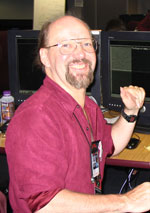Dennis Wellnitz
Science Team Member, Deep Impact

What is the coolest thing about the Deep Impact mission?
I think the coolest thing about the Deep Impact mission is that we are actually doing an experiment that has a large number of potential outcomes, any of which would tell us more about the properties of this particular comet, and therefore something more about comets in general.
Where do you work?
I work at the University of Maryland at College Park in the departments of Astronomy and Physics.
How are you associated with the Deep Impact mission?
I have been involved in a variety of different ways: as the Technical Monitor of the sub-contract to Ball Aerspace & Technologies Corporation for the production of the Deep Impact instruments, as a representative of the concerns of the Principal Investigator and the Co-Investigators with respect to the construction and calibration of the instruments, and as a member of the Science Team calibrating the instruments and interpreting the observations.
Why do you like working at UM?
The University of Maryland is an intellectually stimulating place to be, with a lot of different projects, many interesting people, and a lot of freedom to pursue one's own interests, so long as one can find funding for what one wants to do.
How did you end up working in space science?
I have been working in Physics and Astronomy for many years, specializing in instrumentation (refractometers, interferometers, and imaging systems). When Dr. Lucy McFadden needed someone to help with the Near Earth Asteroid Rendezvous (NEAR) mission Near Infrared Spectrometer (NIS), she asked if I would be interested. I have been involved at least part-time with space science since then.
What is your everyday work life like?
I work a lot with computers and with instrumentation hardware. And every so often I travel to observe or use the instruments, or train others to use them. For the last four years I have been traveling a lot (1-4 weeks per month) in support of the Deep Impact mission.
Are there any barriers to your work?
I work almost entirely on externally funded grants and contracts. So I am never sure that I will remain employed beyond the duration of the grants and contracts that currently support me.
What do you expect to learn from the Deep Impact mission?
I expect to learn a bit more about the surface and interior of the nucleus of comet Tempel 1, and how that is related to the coma, and hope to be able to generalize that knowledge to other comets.
As a child, what did you want to be when you grew up?
For a long time I wanted to be an astronaut, but eventually learned that my physical limitations precluded that. Then I thought that I might like to be an astronomer, and eventually did so, after being trained first as a mathematician and then as a physicist.
At what point did you determine that you would become a scientist?
When I was about 15, I looked at the Astronomy textbook of a college student I had met, and got hooked on astronomy. From then on I was sure I wanted to be a scientist.
Who inspired you?
A lot of people have inspired me, some positively and some because I did not want to be like them. The people who have always most inspired me are those who are willing to boldly follow their ideas wherever they may lead.
Were you a science-oriented kid?
Yes, I was quite interested in science and mathematics, taking all the science and math courses available in junior and senior high school and on through college, and studying on my own the textbooks for courses that weren't offered there.
What was your favorite book as a kid?
I didn't have any one favorite book as a kid. In the area of fiction I was very intrigued with science fiction. But I also loved the general science books of Isaac Asimov as well as general astronomy books. I also read the entire set of books "The History of Mathematics", as well as Friedmann's book on cosmology and Einstein's books on special and general relativity, all of which I found quite inspiring.
What are your leisure time activities?
I like to read, dance, ski, bicycle, and spend time with family and friends. I am also active as an Our Whole Lives facilitator for youth (grades 7-12) and adults, and a trainer of Our Whole Lives facilitators for youth.
Do you have any advice for young scientists?
If you are really interested in being a good scientist, work hard at getting the skills you need, including math, science and computer skills, but also take time to have fun and be a well-rounded individual.











